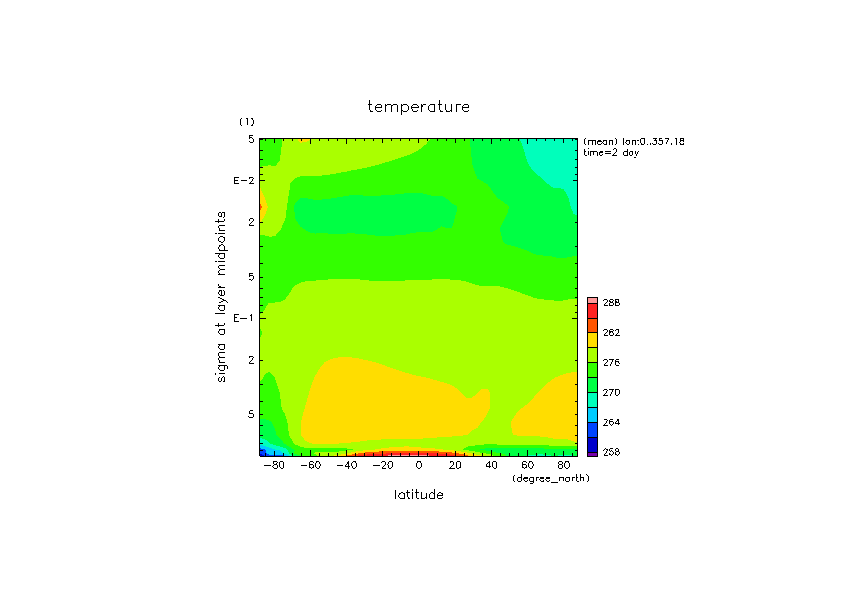Experiment for the Earth
A method to perform an experiment for the Earth is described.
Following physical processes are used in this experiment.
- Radiation (model for the Earth's atmosphere)
- Vertical diffusion (Mellor and Yamada, 1974, level 2)
- Cumulus parameterization: Relaxed Arakawa-Schubert scheme (Moorthi and Suarez, 1992)
- Large scale condensation
- Dry convective adjustment
- Bucket model
Overview
This experiment requires data of distribution of sea surface temperature, surface properties, sea ice density, and ozone. So, the experiment is performed with the following 4 steps:
- Preparation of directory for experiments
- Preparation of initial condition
- Preparation of additional data for experiments
- Execution of experiments
Preparation of a directory for an experiment
Let us move to the top directory of DCPAM5 src tree (assuming dcpam5-YYYYMMDD in the following example). Here, we perform an experiment in ../dcpam5-exp/Earth-exp directory. Please create the directory and enter there as follows:
$ mkdir -p ../dcpam5-exp/Earth-exp $ cd ../dcpam5-exp/Earth-exp
Then, pleaase create the directories for executable files and configuration files as follows:
$ mkdir bin $ mkdir conf
Finally, executable files and configuration files are copied as follows:
$ cp ../../dcpam5-YYYYMMDD/src/main/dcpam_main bin $ cp ../../dcpam5-YYYYMMDD/src/main/dcpam_init_data bin $ cp ../../dcpam5-YYYYMMDD/src/main/dcpam_init_data_surface bin $ cp ../../dcpam5-YYYYMMDD/exp_setup_files/*.conf conf
Here, we perform an experiment in practice/Earth-exp directory. Please create the directory and enter there as follows:
$ cd practice $ mkdir Earth-exp $ cd Earth-exp
Note that you can perform an experiment in any directory by using executable files and configuration (NAMELIST) files.
Preparation of initial data
Create initial data file "init_T42L22.nc" using "bin/dcpam_init_data", "conf/init_data_E_T42L22.conf" and "bin/dcpam_init_data_surface", "conf/surface_data_E_T42.conf"
$ ./bin/dcpam_init_data -N=./conf/init_data_E_T42L22.conf
*** MESSAGE [init_data] *** Run: Initial data generation
*** MESSAGE [init_data] *** -- version = $Name: dcpam5-20150131 $$Id: exp-Earth.rd,v 1.17 2014/07/07 14:50:01 yot Exp $
*** MESSAGE [namelist_util] *** ----- Initialization Messages -----
*** MESSAGE [namelist_util] *** MaxNmlArySize = 256
*** MESSAGE [namelist_util] *** -- version = $Name: dcpam5-20150131 $$Id: exp-Earth.rd,v 1.17 2014/07/07 14:50:01 yot Exp $
*** MESSAGE [timeset] *** NAMELIST group "timeset_nml" is loaded from "./connf/init_data_E_T42L22.conf".
:
*** MESSAGE [initial_data] *** Ueq = 0.
*** MESSAGE [initial_data] ***
*** MESSAGE [initial_data] *** -- version = $Name: dcpam5-20150131 $$Id: exp-Earth.rd,v 1.17 2014/07/07 14:50:01 yot Exp $
*** MESSAGE [HistoryClose] *** "init_T42L22.nc" is closed
############## CPU TIME SUMMARY ################
others 0.120000E-01
------------------------------------------------
TOTAL TIME = 0.120000E-01
$ ./bin/dcpam_init_data_surface -N=./conf/surface_data_E_T42.conf
- ** MESSAGE [sst_data] *** Run: SST data generation
- ** MESSAGE [sst_data] *** -- version = $Name: dcpam5-20150131 $$Id: exp-Earth.rd,v 1.17 2014/07/07 14:50:01 yot Exp $
- ** MESSAGE [namelist_util] *** ----- Initialization Messages -----
- ** MESSAGE [namelist_util] *** MaxNmlArySize = 256
- ** MESSAGE [namelist_util] *** -- version = $Name: dcpam5-20150131 $$Id: exp-Earth.rd,v 1.17 2014/07/07 14:50:01 yot Exp $
- ** MESSAGE [timeset] *** NAMELIST group "timeset_nml" is loaded from "surface_data_E_T42.conf".
&TIMESET_NML CAL_TYPE=noleap ,MONTH_IN_YEAR=-1,DAY_IN_MONTH=-1,-1,-1,-1,-1,-1,-1,-1,-1,-1,-1,-1,-1,-1,-1,-1,-1,-1,-1,-1,-1,-1,-1,-1,
:
*** MESSAGE [HistoryCreate1] *** "surface_T42.nc" is created (origin=0. [day])
*** MESSAGE [HistoryClose] *** "surface_T42.nc" is closed
############## CPU TIME SUMMARY ################
others 0.800000E-02
------------------------------------------------
TOTAL TIME = 0.800000E-02
Preparation of additional data
This experiment requires additional data, sea surface temperature, surface properties, sea ice density, and ozone distribution. Those data are prepared at following site.
Please download "sst_amipII_bc_clim_T042.nc", "sp_for_Earth_T042.nc", "sic_amipII_bc_clim_T042.nc", and "O3_CMIP5_climatology_zonalmean_T042.nc" from above site, and place those files at experimental directory.
Run the experiment
At the last, run a experiment using "dcpam_main" and "dcpam_E_T42L22.conf". Resolution is T42L22, time step is 12 minutes. Integration time is 2 days. A restart data file, a restart data file of surface data, and some history data files are output.
$ ./bin/dcpam_main -N=./conf/dcpam_E_T42L22.conf | tee Earth.log
If initial data, surface data, settings of experiments want to be changed, edit "init_data_T42L22.conf", "dcpam_E_T42L22.conf" in "conf" directory.
Visualization of result
Zonal mean temperature distribution after integration for 2 days is shown below. It should be noted that the figure you draw may not be the same as that shown here because of difference in model version.

This figure is drawn by using Gphys, as follows:
Please type irb.
$ irb
Following prompt of irb is shown.
irb(main):001:0>
Type following lines. Please note that the left-most number is line number, and it has not been typed.
1: require "numru/ggraph"
2: include NumRu
3: gphys = GPhys::IO.open('Temp.nc', 'Temp')
4: DCL.gropn(1)
5: DCL.sgpset('lcntl', false) ; DCL.uzfact(0.7)
6: GGraph.set_fig( 'itr'=> 2 )
7: GGraph.tone( gphys.mean('lon').cut('time'=>2) )
8: GGraph.color_bar
9: DCL.grcls
Type quit to exit irb.
Above figure shows spin-up phase of the atmosphere, because the Earth's atmosphere does not reach quasi-equilibrium in 2 days.
Final remark
If you would like to keep the results of the numerical experiment, please create a sub directory ("data01" for example), move the files, and keep the current directory neatly.
$ mkdir data01 $ mv *.nc *.log data01/
You can output the results of the numerical experimet concurrently with the execution. Please refer to "Change output settings" in Change experimental setup and try to configure "FilePrefix" variable in NAMELIST ">ool_historyauto_nml".
References
- Mellor, G. L., and T. Yamada, 1974: A hierarchy of turbulence closure models for planetary boundary layers, J. Atmos. Sci., 31, 1791--1806.
- Moorthi, S., and M. J. Suarez, 1992: Relaxed Arakawa-Schubert: A parameterization of moist convection for general circulation models, Mon. Wea. Rev., 120, 978--1002.
$Id: exp-Earth.rd,v 1.17 2014/07/07 14:50:01 yot Exp $